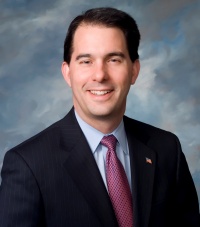Election preview: Wisconsin Governor, Lieutenant Governor face recall elections tomorrow
June 4, 2012
By Greg Janetka
MADISON, Wisconsin: It all comes down to this.
Tomorrow voters will determine the fate of Gov. Scott Walker (R) and Lt. Gov. Rebecca Kleefisch (R) as both face recall elections that have attracted nationwide attention. Will they be removed from their posts or allowed to finish out their terms?
The Wisconsin Government Accountability Board is predicting voter turnout between 60-65 percent - well above the number who showed up for the 2010 general election when Walker and Kleefisch won. According to GAB, the highest turnout in the last 50 years for a November gubernatorial election was 52.4 percent way back in 1962.[1]
In a rematch of the 2010 general election, Walker faces Milwaukee Mayor Tom Barrett (D), along with Independent Hariprasad "Hari" Trivedi, in the recall tomorrow. Barrett lost to Walker by a margin of 52.2 to 46.5 percent, a difference of 124,638 votes. Trivedi was a write-in candidate in 2010, receiving 18 votes.[2] The latest Marquette Law School, conducted May 23–26, found Walker leading Barrett 52-45 percent with a margin of error of +/-4.1[3] Recent polls commissioned by the Greater Wisconsin Committee's political fund and We Are Wisconsin, however, found the race to be all but tied.[4]
Meanwhile, Kleefisch is facing Mahlon Mitchell (D), President of the Professional Fire Fighters of Wisconsin. The duties of lieutenant governor are largely ceremonial and open-ended. Kleefisch said she has focused on being a "jobs ambassador" and business recruiter for the state during her time in office. Mitchell, if elected, said he would address the rise of children living in poverty, as well as acting as a liaison between the governor and the community.[5]
Only two governors in history have been successfully recalled from office - North Dakota Governor Lynn Frazier in 1921 and California Governor Gray Davis (D) in 2003.[6] No lieutenant governor has ever been removed from office in a recall.[7]
Here is a timeline of the events that have led to these unprecedented elections:
2011
- February 15: Assembly Bill 11, better known as the "Scott Walker Budget Repair Bill" is introduced by the request of the governor. Massive protests are held. Two days later all 14 Democratic senators walkout. The bill is passed by the Assembly on the 25th.
- March 9: Senate Republicans amend the bill, passing the revised version which includes limits on collective bargaining. Two days later Walker signs the Budget Repair Bill into law.
- April-June: Organizers successfully collect signatures to put nine recall elections against state senators on the ballot. Three target Democratic incumbents while six target Republicans. Walker and Kleefisch are not eligible for recall until 2012.
- July 19: Democratic Sen. Dave Hansen retains his seat in a recall election.
- August 9: Recall elections were held against Republican incumbents Robert Cowles, Alberta Darling, Sheila Harsdorf, Luther Olsen, Randy Hopper, and Dan Kapanke. Darling, Harsdorf and Olsen held on to their seats, while Hopper and Kapanke were defeated. Republicans held onto control of the Senate by a margin of 17-16.
- August 16: Recall elections were held against Democratic incumbents Jim Holperin and Robert Wirch. Both successfully held onto their seats.
- November 3: Wisconsin Attorney General J.B. Van Hollen issues an opinion stating that the governor and lt. governor would have to be recalled separately.[8]
- November 15: Organizers begin collecting signatures against Walker and Kleefisch.
2012
- January 17: Organizers submit over 1 million signatures to recall Walker[9] and some 845,000 to recall Kleefisch, significantly more than are necessary.[10]
- March 30: The Wisconsin Government Accountability Board certifies enough signatures are valid and schedules the recall elections.[11]
- May 8: Walker defeats Arthur Kohl-Riggs, a Democrat who ran as a Republican, in the primary. Milwaukee Mayor Tom Barrett defeats four challengers in the Democratic primary. Kleefisch is unopposed in the Republican primary while Mahlon Mitchell, President of the Professional Fire Fighters of Wisconsin, defeats two challengers for the Democratic nomination.[12]
- June 5: Recalls elections will take place against the governor and lieutenant governor. Four Republican state senators also face recalls.
See also
- Scott Walker recall, Wisconsin (2012)
- Rebecca Kleefisch recall, Wisconsin (2012)
- Matchups set for six recalls in Wisconsin
Footnotes
- ↑ Wisconsin Government Accountability Board, "Voter Turnout Estimated at 60 to 65 percent for June 5 Recall Election," May 29, 2012
- ↑ Wisconsin Government Accountability Board, "G.A.B. Canvass Reporting System," accessed June 1, 2012
- ↑ BusinessWeek, "Wisconsin’s Walker Leads Barrett 52%-45% in Recall Race Poll," May 30, 2012
- ↑ Washington Post, "Dem poll: Walker recall battle is a dead heat," May 30, 2012
- ↑ The Daily Page, "What does the lieutenant governor do? Rebecca Kleefisch, Mahlon Mitchell vie for an open-ended job," May 31, 2012
- ↑ Washington Post, "Scott Walker: The mechanics of a Wisconsin governor recall," November 16, 2011
- ↑ Wisconsin Reporter, "Historic Day: WI’s governor, lt. governor recalled," March 30, 2012
- ↑ Wisconsin Government Accountability Board, "Attorney General Opinion on Recall of Governor and Lieutenant Governor," November 4, 2011
- ↑ Chicago Sun-Times, "Groups file signatures to recall governor," January 17, 2012
- ↑ Wisconsin Government Accountability Board, "Committee to Recall Kleefisch," accessed November 16, 2011
- ↑ Milwaukee Journal Sentinel, "Recall votes set for May 8 and June 5," March 14, 2012
- ↑ Milwaukee Journal Sentinel, "May 8 recall primary election results," May 8, 2012
| |||||





